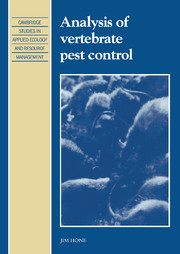1 - Introduction
Published online by Cambridge University Press: 08 September 2009
Summary
Pests can be defined as organisms that cause harm: economic, environmental or epidemiological. Cherrett et al. (1971) defined a pest animal as one which is noxious, destructive or troublesome to humans. Woods (1974) qualified the definition to incorporate a requirement of causing economic damage. Today, vertebrates cause problems in agriculture: to crops, to livestock, in and around buildings and other equipment and by spreading diseases. Problems also occur in forestry, in conservation of plant and animal species and communities, in urban industry and in our own homes.
There are difficulties, however, in defining a pest (Harris, 1989). Is it that coyotes kill sheep or the number of sheep killed that causes coyotes to be called a pest? Answering this question is partly a social issue but also a scientific issue. This book is about the science of evaluating vertebrate pest control with particular emphasis on mammals and birds as pests; how to analyse whether populations of vertebrates really are pests and how to plan and assess what is achieved by pest control. It is not, however, about how to control vertebrate pests. For example, the book is not about how to control rats and mice, but describes how to determine if they are pests, and if so, how to estimate what is achieved by control.
Worldwide in scope, the book describes and critically reviews the literature on a range of analyses used in vertebrate pest research and management.
- Type
- Chapter
- Information
- Analysis of Vertebrate Pest Control , pp. 1 - 7Publisher: Cambridge University PressPrint publication year: 1994
- 1
- Cited by

